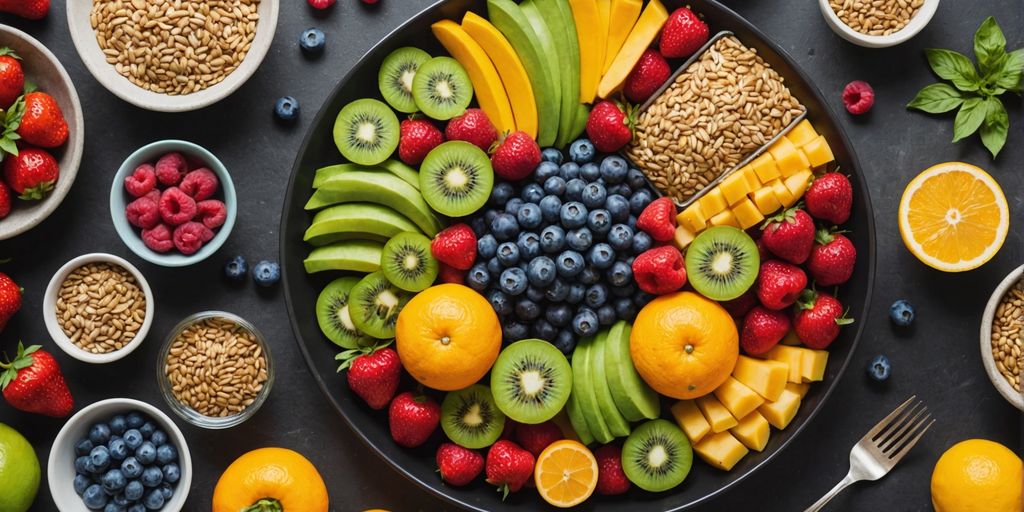
Eating well isn’t just about looking good—it’s about feeling good too. Good nutrition plays a big role in how we feel every day. It helps our bodies work right and keeps our minds sharp. This article will explore how what we eat affects our physical health, mental well-being, aging process, disease prevention, and even our sleep. Plus, we’ll give you some easy tips to make healthier food choices.
Key Takeaways
- Good nutrition boosts your energy levels, helping you get through your day with more vigor.
- Eating the right foods can help manage your weight and support your fitness goals.
- Proper nutrition is essential for both physical health and mental well-being.
- Healthy eating can slow down the aging process and help you live a longer, healthier life.
- Making small changes in your diet can have big impacts on preventing diseases and improving your overall health.
The Role of Nutrition in Physical Wellness
Essential Nutrients for the Body
A well-balanced diet provides you with energy and the nutrients you need for growth and repair, helping you to stay strong and healthy. Proper nutrition is imperative to maximize physical performance. Without enough carbohydrates, proteins, and fats, you may feel sluggish during daily activities.
Impact on Energy Levels
Eating the right foods can boost your energy levels, making you prepared to face each day. A more nutrient-rich diet means more fuel for you to power through your workday, your workout, and all those chores you need to do. Want to maximize your energy level? Eat smaller meals more frequently, incorporate all the food groups, avoid alcohol, and drink plenty of water.
Weight Management Through Diet
Taking control of your weight is easier than you think. You just need to pay attention to nutrition facts and make strategic choices about what you consume. Better nutrition fosters more energy, so you’ll be able to make it through your workout without crashing. On top of helping you stick with your workout plan, good nutrition means your body is getting everything it needs. This can help you avoid cravings and binges that threaten your fitness and weight loss goals.
Mental Health Benefits of Proper Nutrition
Nutrients That Boost Brain Function
Eating a nutrient-rich diet can support mental health by providing essential vitamins, minerals, and fatty acids needed for neurotransmitter production and brain health. Foods rich in omega-3 fatty acids, such as fish, flaxseeds, and walnuts, are particularly beneficial. B vitamins, found in leafy greens and whole grains, also play a crucial role in brain function.
Diet and Mood Regulation
What you eat can directly affect your mood. A diet high in refined sugars and processed foods can lead to mood swings and even symptoms of depression. On the other hand, consuming whole, unprocessed foods can help stabilize your mood. Carbohydrates, especially those from whole grains, allow the amino acid tryptophan to enter the brain, where it produces serotonin, a mood-enhancing neurotransmitter.
When you stick to a diet of nutrient-rich foods, you’re setting yourself up for fewer mood swings and an improved ability to focus.
Preventing Cognitive Decline
Proper nutrition can also help prevent cognitive decline as you age. Antioxidant-rich foods like berries, nuts, and dark chocolate can protect your brain from oxidative stress. Additionally, diets high in fruits, vegetables, and whole grains have been linked to a lower risk of dementia and other cognitive impairments.
In summary, eating well may help prevent or reduce symptoms of anxiety while also promoting a healthier body. By making mindful dietary choices, you can support both your mental and physical well-being.
How Nutrition Affects Aging

Nutrients for Longevity
What you eat at 40 may affect how healthy you are at 70. A diet rich in fruits, vegetables, whole grains, and unsaturated fats can increase your odds of aging healthfully. Certain nutrients can help you live longer and better. For example, antioxidants found in berries and nuts protect your cells from damage, while omega-3 fatty acids in fish support heart health.
Dietary Choices to Combat Aging
Eating a balanced diet with plenty of fruits, vegetables, and whole grains can help combat the effects of aging. Foods high in vitamins and minerals, like leafy greens and nuts, support your body’s functions and keep you feeling young. Avoiding processed foods and sugars can also reduce inflammation and improve your overall health.
Maintaining Vitality Through Nutrition
To maintain vitality as you age, focus on a diet that includes a variety of nutrient-dense foods. Legumes, lean proteins, and low-fat dairy are excellent choices. Staying hydrated and eating smaller, more frequent meals can also help keep your energy levels stable throughout the day.
A nutritious diet in midlife is linked to healthier aging. By making smart food choices now, you can enjoy a more vibrant and active life as you get older.
The Connection Between Nutrition and Disease Prevention
Foods That Fight Inflammation
Inflammation is a natural response of the body to injury or infection, but chronic inflammation can lead to serious health issues. Certain foods can help reduce inflammation and improve overall health. Foods rich in omega-3 fatty acids, such as salmon and flaxseeds, are known to combat inflammation. Additionally, fruits and vegetables high in antioxidants, like berries and leafy greens, can also help reduce inflammation.
Nutritional Strategies to Prevent Chronic Diseases
A balanced diet is crucial in preventing chronic diseases. Lower food security is associated with a higher probability of chronic disease diagnosis, including hypertension and coronary heart disease. To prevent these conditions, it’s important to consume a variety of nutrients. This includes eating plenty of fruits, vegetables, whole grains, and lean proteins. Avoiding processed foods and sugary drinks can also help reduce the risk of chronic diseases.
The Role of Antioxidants in Health
Antioxidants play a vital role in protecting the body from damage caused by free radicals. These free radicals can lead to various diseases, including cancer and heart disease. Foods high in antioxidants, such as nuts, seeds, and colorful fruits and vegetables, can help protect the body. Incorporating these foods into your diet can improve your overall health and reduce the risk of disease.
Nutrition is a critical part of health and development. Better nutrition is related to improved infant, child, and maternal health, and stronger immune systems.
Practical Tips for Incorporating Healthy Nutrition Into Daily Life
Meal Planning and Preparation
Planning your meals ahead of time can make a big difference. Preparing a week’s worth of chopped veggies and cooked beans can make DIY meals easier and just as tempting as take-out. If you’re short on time, consider using frozen fruits and vegetables, and quick-cooking grains like brown rice or quinoa.
Healthy Snacking Options
Choosing healthy snacks can keep your energy levels stable throughout the day. Opt for snacks like nuts, fruit, yogurt, and low-fat cheese. These options are not only nutritious but also help you avoid the quick energy crashes that come from sugary snacks.
Balancing Macronutrients and Micronutrients
A balanced diet includes a mix of macronutrients and micronutrients. Make sure to incorporate all food groups into your meals. Avoid processed foods and sugary drinks, and focus on whole grains, lean proteins, and plenty of fruits and vegetables. Staying hydrated is also crucial for maintaining overall health.
You don’t have to make all these changes at once. Start by making small, manageable adjustments each week. For example, one week you could replace processed sugar with fresh fruit, and the next week you could add more vegetables and lean protein. There’s no one-size-fits-all when it comes to your health.
The Impact of Nutrition on Immune System Function
Vitamins and Minerals for Immune Support
A well-balanced diet is crucial for a strong immune system. An adequate intake of iron, zinc, and vitamins A, E, B6, and B12 is particularly important for the maintenance of immune function. These nutrients help your body fight off infections and keep you healthy.
Dietary Habits to Strengthen Immunity
To boost your immune system, focus on eating a variety of fruits, vegetables, lean proteins, and whole grains. Avoid processed foods and sugary snacks, as they can weaken your immune response. Drinking plenty of water and getting enough sleep are also essential for maintaining a healthy immune system.
Foods to Avoid for Better Immune Health
Certain foods can negatively impact your immune system. It’s best to avoid excessive alcohol, sugary drinks, and foods high in saturated fats. These can lead to inflammation and weaken your body’s ability to fight off infections.
A strong immune system is your body’s best defense against illness. By making smart dietary choices, you can help ensure your immune system functions at its best.
Understanding the Relationship Between Nutrition and Sleep
Foods That Promote Better Sleep
Certain foods are known to help you sleep better. For example, foods rich in magnesium and vitamin B6, like bananas and nuts, can improve sleep patterns. Eating these foods regularly can help you fall asleep faster and stay asleep longer. Additionally, foods high in tryptophan, such as turkey and dairy products, can also promote better sleep.
Nutritional Deficiencies and Sleep Disorders
Lack of certain nutrients can lead to sleep disorders. For instance, a deficiency in magnesium or vitamin D can cause insomnia or restless sleep. It’s important to ensure your diet includes a variety of nutrients to avoid these issues. Iron deficiency is another common cause of sleep problems, particularly in women.
Creating a Sleep-Friendly Diet
To create a diet that supports good sleep, focus on balanced meals that include a mix of protein, healthy fats, and complex carbohydrates. Avoid caffeine and sugar close to bedtime, as they can disrupt your sleep. Instead, opt for a light snack that includes sleep-promoting nutrients. Drinking plenty of water throughout the day is also crucial for maintaining good sleep hygiene.
A well-balanced diet not only supports overall health but also plays a crucial role in ensuring you get a good night’s sleep. By paying attention to what you eat, you can improve your sleep quality and overall well-being.
Conclusion
In conclusion, the impact of nutrition and health on our daily lives is undeniable. Eating a balanced diet filled with essential nutrients not only boosts our energy levels but also helps maintain a healthy weight and supports overall well-being. Good nutrition can improve brain function, enhance mood, and even slow down the aging process. By making mindful food choices, we can protect ourselves from various diseases and lead a more productive, fulfilling life. Remember, taking small steps towards better nutrition can lead to significant positive changes in your daily routine and long-term health.
Frequently Asked Questions
How does good nutrition affect my energy levels?
Eating nutrient-rich foods can give you more energy for your daily activities. Smaller, frequent meals, including all food groups, avoiding alcohol, and drinking plenty of water can help keep your energy up.
Can a healthy diet help me manage my weight?
Yes, eating a balanced diet with fruits, vegetables, whole grains, and lean proteins can help you maintain a healthy weight. Good nutrition also provides the energy needed for regular exercise, which supports weight management.
What nutrients are important for brain health?
Nutrients like omega-3 fatty acids, antioxidants, and certain vitamins (like B vitamins) are essential for brain function. These nutrients can help boost brain power and prevent cognitive decline.
How does nutrition influence aging?
A healthy diet can help you age better by supporting your immune system and digestive functions. Certain nutrients can fight inflammation and reduce the risk of age-related diseases.
What foods can help prevent chronic diseases?
Foods rich in antioxidants, fiber, and healthy fats can help prevent chronic diseases like heart disease, diabetes, and cancer. These include fruits, vegetables, whole grains, nuts, and fish.
How can I improve my diet to support my immune system?
Eating foods rich in vitamins and minerals, such as fruits, vegetables, nuts, and seeds, can boost your immune system. Avoiding processed foods and sugars also helps keep your immune system strong.






